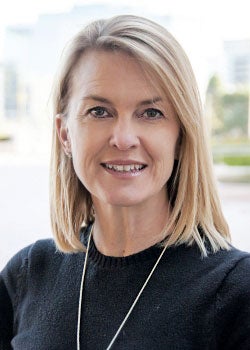
A Net Gain for Healthcare Administration
FSPH’s online MHA degree program meets a growing need in a rapidly changing landscape.

As the population increases and a large portion of the current workforce reaches retirement age, the demand for highly skilled health management professionals in California and nationally is projected to grow substantially. To help meet that demand in a rapidly changing healthcare landscape, the UCLA Fielding School of Public Health has introduced an online Master of Healthcare Administration (MHA) degree program. The MHA degree — the first offered in the University of California system — equips early- and mid-career healthcare professionals with skills in areas such as finance, strategic marketing, quantitative problem solving, and analytics; moreover, the flexibility of the online platform affords them access to a Fielding School degree program regardless of geography, while they continue to work full time.
According to the federal Bureau of Labor Statistics, the ranks of medical and health services managers in the U.S. will increase much faster than the average for all occupations in the decade between 2019 and 2029 — from approximately 422,300 to more than 555,000. “As healthcare grows, experts in administration, operations, and analytics will be an important element supporting the clinical side of the industry,” says Dr. Leah Vriesman, professor in FSPH’s Department of Health Policy and Management (HPM) and executive director of the new program, which welcomes its first class this summer.
But the field of healthcare administration isn’t just growing; it’s also transforming in ways that require new skill sets. “As advances in healthcare information technology change the ways providers use data, there will be an increased demand for experts in healthcare administration and leadership, and as healthcare moves into new forms of delivery, such as tele-functions, it will get no less complicated,” says Vriesman, head of HPM’s executive education programs and co-director of the school’s UCLA Center for Healthcare Management. “These and other developments create enormous opportunities to start or advance a rewarding career in a field that impacts people’s lives.”
Although Vriesman expects that the new program will draw most heavily from the Southern California region, it will also appeal to professionals in distant and rural communities, where historically there has been a vast unmet need. “Advanced educational opportunities in this industry have been limited in these areas due to geographical barriers,” Vriesman says. “We educate healthcare managers in our urban areas, but we don’t do as good of a job reaching rural and semi-rural communities. We see this new Master of Healthcare Administration degree program as an opportunity to go beyond our usual geographic area to help address that need.”
It’s important that healthcare administrators understand community health and social determinants of health, and not just treat healthcare as a business.

Vriesman notes that the MHA program will prepare graduates to succeed in any healthcare setting — within hospitals, health systems, community clinics, and nursing facilities, as well as biopharmaceutical companies, large physician group management organizations, public agencies, insurance companies, and health technology businesses. “This degree was once very specific to working in hospitals,” Vriesman says. “Increasingly, the industry is a rich tapestry of settings. It’s becoming more complex with more career pathways, and we want to ensure that we’re training future administrators who understand all of the components of the healthcare industry.”
Reflecting the breadth of knowledge required of today’s healthcare administrators, the Fielding School’s MHA curriculum emphasizes both quantitative and qualitative skills. “We have more data than ever before — including financial, operational, electronic medical record, and quality-and-safety data — and our administrators require skills in interpreting and presenting it in order to be good leaders,” Vriesman says. “But the interaction with the patient also must be an important part of the conversation. We need people with good communication skills and emotional intelligence, who understand that now more than ever, it’s the patient who is at the center of everything we do."
The program combines conceptual knowledge with hands-on experience. “Students will expand their professional networks and consult with healthcare organizations on projects,” Vriesman explains. Capstone projects require students to work with a healthcare organization in their community in solving a real-world problem.
Vriesman stresses that all of the program’s content is grounded in public and population health concepts. “We take the public health part of our mission very seriously,” she says. “It’s important that healthcare administrators understand community health and social determinants of health, and not just treat healthcare as a business. Our faculty are public health experts who specialize in healthcare management.”
As the MHA was developed, FSPH sought input from practitioners in the field — a group Vriesman refers to as the program’s stakeholders. “They are the purchasers of our product, which is well-trained graduate students,” Vriesman says. “So it’s important to learn from them what they want in a high-quality healthcare administrator.” A professional advisory council will continue to provide guidance as the program develops.
The new program is a welcome development for healthcare executives such as Thomas Priselac, president and CEO of Cedars-Sinai Health System. “Affordable, high-quality healthcare and an equitable healthcare system are only possible if those leading and operating the delivery system have the necessary skills to develop and operate organizations aligned with that vision,” Priselac says. “The UCLA Fielding School’s new MHA program will play a critical role in educating tomorrow’s delivery system leaders. The online nature of the program will enhance accessibility by potential students, thereby responding to the urgent need for a master’s-prepared leadership workforce.”
An important element of the online program is the access it provides — not just to professionals in rural areas, but also to those in Greater Los Angeles and beyond for whom a commute to the UCLA campus would be difficult, as well as to students who would be unable to complete a graduate program without the ability to continue working full time. The online MHA combines asynchronous activities, such as lecture videos and reading assignments, with weekly opportunities to interact live with peers and instructors. The two-year program also includes two required on-campus immersions.
“This online MHA opens up access to professionals who would not otherwise be able to come to UCLA and the Fielding School,” Vriesman says. “That’s one of many things we’re very excited about.”
